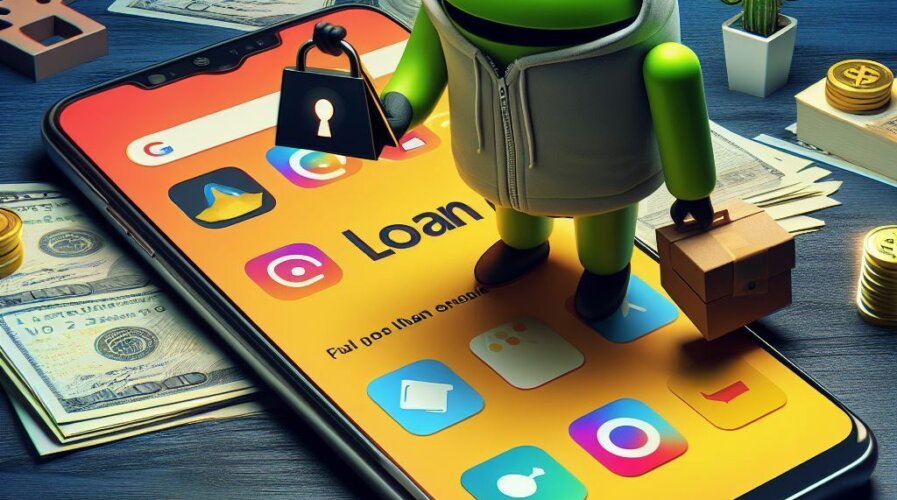Newsletter Subscribe
Enter your email address below and subscribe to our newsletter

The convenience of loan apps has revolutionized the way we handle our finances. With just a few taps, users can apply for loans, manage repayments, and even transfer funds seamlessly.
However, amidst this convenience, concerns about privacy and data security loom large. One such concern is whether a loan app can access a user’s contacts even after uninstalling the application.
In this piece, we will look into and understand the mechanisms at play and how users can safeguard their privacy.
A loan app, short for loan application, is a mobile application designed to facilitate the process of borrowing money. These apps allow users to apply for loans, receive funds, manage repayments, and sometimes even access financial planning tools directly from their smartphones or other mobile devices.
Loan apps are offered by various financial institutions, including banks, online lenders, and peer-to-peer lending platforms, and they aim to provide convenient and accessible access to credit services.
Users typically download these apps from app stores, such as the Apple App Store or Google Play Store, and may need to undergo a verification process to access the loan services offered by the app.
Read also: Loan Apps With Low-Interest Rates in Nigeria 2024
When a user installs a loan app on their smartphone, the app typically requests certain permissions to function optimally. These permissions may include access to contacts, location, camera, and other device functionalities. The rationale behind these permissions varies; for instance, accessing contacts may facilitate the app in identifying potential borrowers or enabling seamless transactions.
Once granted, permissions can persist even after uninstalling the app. This is because modern smartphones store app permissions at the system level, separate from the app itself. Consequently, if a user reinstalls the same app or a similar one, it may still retain the previously granted permission
In the context of contact access, this means that a loan app, if granted permission, may retain access to a user’s contacts even after uninstallation. This access could potentially be exploited for various purposes, such as marketing, data analytics, or even sold to third-party entities.
The idea of a loan app having access to personal contacts raises significant privacy concerns. Contacts often contain sensitive information, including names, phone numbers, email addresses, and sometimes even personal notes. Unauthorized access to this data could lead to privacy breaches, spamming, or even identity theft.
To address such privacy concerns, regulatory bodies around the world have enacted laws and regulations governing data protection and privacy. For instance, the General Data Protection Regulation (GDPR) in the European Union mandates strict guidelines for the collection, processing, and storage of personal data. Similarly, jurisdictions like the United States have laws such as the California Consumer Privacy Act (CCPA) aimed at safeguarding consumer data.
Read Also: Full List of Genuine Loan Apps in Kenya

No, an uninstalled loan app cannot access your contacts. Here’s why:
Uninstalling an app removes all permissions you granted it. This means the app loses access to everything on your phone, including your contacts.
Uninstalled apps aren’t running in the background. They can’t interact with your phone or steal information.
There is one caveat, though, If you allowed the loan app to access your contacts before uninstalling, it’s possible (but unlikely) the app copied your contacts to its own servers. This is a malicious practice, but technically possible for disreputable apps.
Read also: Mpesa Loan Apps in Kenya
As users, there are several steps we can take to mitigate the risks associated with loan apps accessing our contacts:
Before installing any app, carefully review the permissions it requests. If an app asks for access to contacts and you find it unnecessary for its functionality, reconsider installing it.
Most smartphones allow users to control app permissions manually. Take advantage of this feature to restrict unnecessary permissions, including contact access, for loan apps and other applications.
Periodically review the list of installed apps on your device and assess their permissions. If you no longer use a particular app or find its permissions concerning, consider uninstalling it.
Stay updated with the latest developments in data privacy and security. Be aware of any breaches or controversies involving loan apps or other financial applications.
Read also: Top 8 Easy Loan Apps in Nigeria
Beyond just accessing your contacts, loan apps may ask for a lot more of your personal information, which can make you worry about your privacy and safety. Here’s a simple explanation of some potential problems:
Imagine loan apps wanting to know where you are at all times, like a virtual GPS. They might say it’s to understand how you spend your money or to make sure you actually live where you say you do. But it can feel intrusive, like someone constantly looking over your shoulder.
This is like someone going through your text messages or call logs to see who you’ve been talking to. They might say it’s to figure out if you’re good at managing money based on who you communicate with. But it can feel like someone peeking into your private life, which can be uncomfortable.
Just like how a leak in a boat can let water in, a leak in a loan app’s security can let your financial information out. If hackers manage to break into the app’s system, they could steal your sensitive financial details, like your bank account or credit card information.
Loan apps often require users to provide personal information such as full name, date of birth, address, and government-issued ID numbers. This sensitive data can be a target for identity theft if the app’s security measures are inadequate.
In addition to basic personal details, loan apps typically request financial information such as income, employment details, and bank account information. This data is essential for assessing loan eligibility but also presents a significant risk if it falls into the wrong hands.
Many loan apps collect device information such as unique device identifiers, IP addresses, and operating system details. While this data helps optimize app performance and security, it also poses privacy risks if mishandled or shared with third parties without consent.
Loan apps may track user behavior within the app, including the pages visited, buttons clicked, and time spent on each screen. This information can be used for targeted advertising or sold to third-party marketers, potentially compromising user privacy.
Some loan apps may request permission to access credit bureau reports to assess a user’s creditworthiness. While this is common practice in the lending industry, users should be cautious about granting such access and ensure that it complies with relevant data protection regulations.
Certain loan apps may also integrate with social media platforms, allowing them to access additional user data such as friends lists, posts, and photos. While this integration may offer convenience for users, it also raises privacy concerns about the extent of data sharing and potential misuse.
Always think twice before giving out personal information. Only share what’s absolutely necessary for getting the loan.Also Check Privacy Policies.It’s like reading the terms and conditions before agreeing to something. Look for apps that are upfront about what they do with your data and how they protect it.
Just like you might choose a different route if one road is blocked, consider traditional banks or online lenders with a good reputation for keeping your information safe. They might offer similar services without the privacy concerns.
Read also: Top 10 Loan Apps for Urgent Loans in Kenya
When it comes to using loan apps safely, thorough research is your best friend. Take the time to look at the app’s reputation, dive into user reviews, and compare its offerings with other lenders in terms of interest rates and repayment terms.
Understanding the terms and conditions is crucial. Don’t just skim through them—carefully read and comprehend every detail, including repayment schedules, late fees, and any hidden costs that might catch you off guard later on.
Keep an eye out for predatory practices. Some loan apps may try to lure you in with seemingly attractive offers only to trap you in a cycle of debt with exorbitant interest rates, unreasonable penalties, or shady collection tactics. Be wary of any red flags, such as promises that sound too good to be true or pressure to apply for a loan hastily.
Responsible borrowing means only taking out loans that you’re confident you can repay within the agreed-upon timeframe. Borrowing more than you can handle could spell trouble down the line, leading to missed payments, damaged credit scores, and a snowball effect of financial woes.
By adhering to these essential practices, you can navigate the world of loan apps with greater confidence and minimize the associated risks.
No, once you uninstall a loan app, it loses access to all your phone’s data, including your contacts. Uninstalling removes the app’s permissions, essentially cutting it off from your device.
Some loan apps request contact information to perform a “soft credit check.” This might involve analyzing your contacts to assess your financial network’s stability or use them for marketing purposes. However, be cautious about granting such permissions.
There’s an inherent risk. While reputable apps likely use the data responsibly, there’s always a chance of malicious apps copying your contacts for unknown purposes.
Even if the app copied your contacts, uninstalling cuts off future access. However, if you’re concerned, some phones allow you to clear app data even after uninstalling. Check your phone’s settings for such options.
Report the app to your app store and consider filing a complaint with the relevant authorities.
While the convenience offered by loan apps is undeniable, it’s crucial to remain vigilant about our privacy and data security. The ability of loan apps to access contacts even after uninstallation underscores the need for greater awareness and proactive measures from both users and regulatory bodies.
If you found this piece useful, kindly drop a nice comment. Also visit and follow us on X @SiliconAfriTech for access to other useful contents.